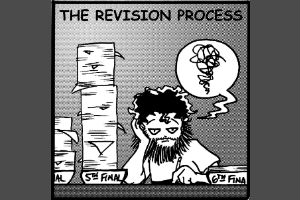Study skills part two: top 10 revision rules
Published on 3 May 13

In the second part of our series we will be looking at revision techniques with the help of some recent graduates who have compiled the top 10 revision rules for exam success
1. Don’t keep it to yourself! Share your knowledge
Don’t feel that to revise you have to lock yourself away, meet up with your class mates and revise together! Helping one another out will help you to, if you can explain a concept to your friend, you know you will be able to explain it in an exam. They'll be able to help you out as well and you can test each other, perfect!
2. Find a spot that works for you
I could never stay in one spot for too long. I like to move around which works for me and is handy when studying at such a large university! It is important to find a spot that works best for you. Don't just plonk yourself down in the first empty seat you find. And even though it may be difficult, if you know you're easily distracted like I am, don't sit near a window or anything remotely interesting!
| Take a look at this week’s Food Monthly to find the best cafes on campus or, if you don’t fancy any of those, take a look at our Study spaces board for a range of different study spots on campus. |
3. What did they ask last year?
Past papers are a great way to revise. These can be found online or ask your lecturer for them. Make sure you do some revision before looking at the answers though!
4. Go and see your academic.
Stuck with something? Ask your lecturer for help, they’ll be more than willing to help you out! I spent a lot of time in academics offices asking what I thought were silly questions and guess what? I didn’t get laughed at, in fact I wasn’t the only person with that question.
| Have a look at our Unsure about how to meet your academics article for more help. |
5. Don’t compare yourself to your friends.
There’s always someone you know who started revising weeks before you, devotes more time to studying than you and who’s more organised than you. You’re not them. Do what works for you and don’t worry about how much preparation others are doing.
6. Ban yourself from Facebook/Twitter.
De-activate your account for a week and challenge yourself to keep to it. We all know that social media can be a real big distraction so imagine how much time you could save if you no longer have any notifications! Make sure you keep checking your emails though, you don't want to miss anything important such as deadline extensions - well, we can be optimistic!
7. Create a revision friendly playlist
Try easy listening music rather than rap/rock. Also take note of the word 'playlist': You won’t get much done if you’re scrolling down YouTube every five minutes to find another song!
8. Make a plan and stick with it
Plan out your day, decide when you’re having a break and figure out where to fit tasks. If you have a bus/train ride to a lecture, think about what work you could squeeze in.
9. Be creative
Mind maps, flash cards, post it note prompts, creating colourful revision notes will help you revise. Stick them on your fridge/cupboard doors/bathroom mirror and make sure you read them every time you’re there.
10. Treat yourself
You need to reward yourself every now and then, especially at revision time. Make the treat match the amount of work you’ve done; spent the morning revising? Watch a bit of telly. Finished that essay? Go out for a meal or watch a movie. Just make sure you just spend all your cash now – you’ll need to save some for the end of exam celebrations!
Here are a few other resources you may find useful:How your brain likes to be treated at revision time – Seven top scientific tips to help you remember stuff. 10 things academics say students get wrong in exams – Make sure you don’t get caught making any of these mistakes. Study Skills Website Revision Strategies – This site is really useful regardless of what degree you are studying. |
